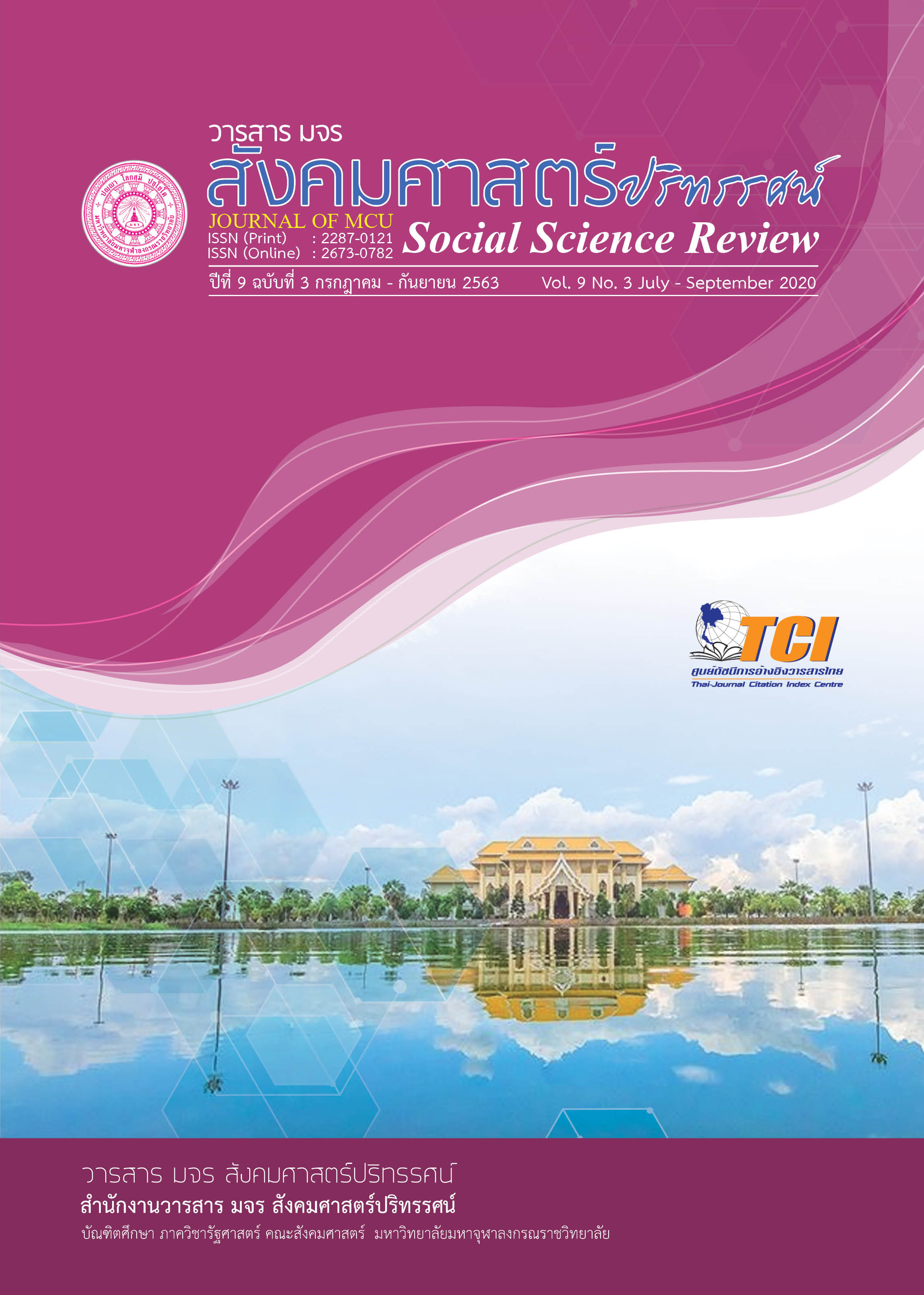ศึกษากระบวนการเสริมสร้างความมั่นคงของครอบครัว ตามแนวพุทธจิตวิทยาบูรณาการ
คำสำคัญ:
ความมั่นคงของครอบครัว, พุทธจิตวิทยา, บูรณาการบทคัดย่อ
บทความวิจัยนี้มีวัตถุประสงค์ 1. เพื่อศึกษาแนวคิดและกระบวนการเสริมสร้างความมั่นคงของครอบครัวตามแนวพุทธจิตวิทยา 2. เพื่อพัฒนากระบวนการเสริมสร้างความมั่นคงของครอบครัวตามแนวพุทธจิตวิทยาของครอบครัว 3. วิเคราะห์รูปแบบการเสริมสร้างความมั่นคงของครอบครัวตามแนวพุทธจิตวิทยาของครอบครัว โดยผู้วิจัยได้ใช้รูปแบบคุณภาพ ด้วยการสัมภาษณ์เชิงลึกกับครอบครัวในพื้นที่ รวมถึงผู้นำชุมชน และผู้สูงอายุในพื้นที่ และการสังเกตแบบไม่มีส่วนร่วมกับตัวอย่างแบบเจาะจงจำนวน 24 คน เพื่อหาลักษณะร่วม และข้อสรุปร่วมวิธีการวิเคราะห์เอกสารเนื้อหา ผลการวิจัยพบว่า แนวคิดการเสริมสร้างความมั่นคงของครอบครัวเกิดจากแนวความคิดพื้นฐานคือครอบครัว เป็นการให้ความรัก ช่วยเหลือเกื้อกูลกัน ปลูกฝังคุณธรรม จริยธรรม ค่านิยม และถ่ายทอดวัฒนธรรมทางสังคมให้แก่สมาชิกในครอบครัว การพัฒนากระบวนการเสริมสร้าง จะเริ่มจาก 1. การสร้างกิจกรรมสันทนาการร่วมกัน 2. การกล่อมเกลาทางสังคม 3. การสอนให้ปฏิบัติตามจารีตประเพณีที่สืบต่อกันมา ส่วนรูปแบบการเสริมสร้างความมั่นคงของครอบครัวตามแนวพุทธจิตวิทยาของครอบครัว พบว่าจะเริ่มต้นจากการส่งเสริมกำลังใจให้แก่กันด้วยการทำกิจกรรมสันทนาการต่าง ๆ ร่วมกัน มีการสร้างกำลังใจให้กับบุคคลภายในครอบครัวตามโอกาสสำคัญต่างๆ และการส่งเสริมให้คนในครอบครัวรักษาขนบธรรมเนียมประเพณีและวัฒนธรรมไทย เพื่อก่อให้เกิดการมีจิตใจที่ดี
เอกสารอ้างอิง
จำเนียร รักษาภักดี. (2544). การศึกษาเรื่องจริยธรรมของคู่สมรสตามหลักพุทธศาสนา. กรุงเทพฯ: มหาวิทยาลัยธรรมศาสตร์.
ชมพูนุช ศรีจันทร์นิล. (2552). จิตวิทยาแนวพุทธ : แนวทางเพื่อการเยียวยาและพัฒนาจิตใจมนุษย์. วารสารวิชาการ มหาวิทยาลัยหอการค้าไทย, 29(4), 188-208.
บรรยวัสถ์ ฝางคำ และ นฤมล ดวงแสง. (2553). การประยุกต์หลักพุทธธรรมเพื่อเสริมสร้างความเข้มแข็งให้แก่สถาบันครอบครัวและชุมชนตามนโยบายการป้องกันปัญหาสารเสพติดของจังหวัดอุบลราชธานี (รายงานการวิจัย). อุบลราชธานี: มหาวิทยาลัยมหาจุฬาลงกรณราชวิทยาลัย วิทยาเขตอุบลราชธานี.
พรฤดี นิธิรัตน์และคณะ. (2558). ผลของโปรแกรมสร้างเสริมสุขภาพจิตครอบครัวสามวัย ต่อการรับรู้บทบาทของสมาชิกและสัมพันธภาพในครอบครัว. วารสารศูนย์การศึกษาแพทยศาสตร์คลินิก โรงพยาบาลพระปกเกล้า, 32(1), 18-33.
พระครูสมุห์จิรชาติ พุทฺธรกฺขิโตและคณะ. (2563). ประสิทธิผลการจัดการสวัสดิการผู้สูงอายุของเทศบาลเมืองท่าช้าง จังหวัดจันทบุรี. วารสาร มจร สังคมศาสตร์ปริทรรศน์, 9(2), 156-165.
พระธรรมปิฏก (ประยุทธ์ ปยุตฺโต). (2539). การสร้างสรรค์ปัญญาเพื่ออนาคตของมนุษยชาติ. กรุงเทพฯ : อักษรสยามการพิมพ์.
พระพรหมเวที (สุเทพ ผุสฺสธมฺโม). (2563). การเสริมสร้างค่านิยมสุจริตของสถาบันครอบครัวตามหลักพระพุทธศาสนา. วารสาร มจร สังคมศาสตร์ปริทรรศน์, 9(2), 1-12.
ศักดิ์ชัย บุญเพ็ง. (2556). ทัศนะต่อแนวทางการเสริมสร้างความสัมพันธ์ในครอบครัวของเจ้าหน้าที่ตำรวจกองบังคับการตำรวจนครบาล 6 (วิทยานิพนธ์ปริญญาสังคมสงเคราะห์ศาสตรมหาบัณฑิต). กรุงเทพฯ: มหาวิทยาลัยธรรมศาสตร์.
สุรินทร์ธร ศิธรกุล. (2558). ผู้นำการบริหารกิจการบ้านเมืองที่ดีขององค์กรปกครอง ส่วนท้องถิ่นในเขตจังหวัดภาคตะวันออกเฉียงเหนือตอนล่าง. วารสารวิชาการ มหาวิทยาลัยราชภัฏพระนคร, 6(2), 283-297.
อนันต์ อุปสอดและอณิษฐา หาญภักดีนิยม. (2559). ศึกษากระบวนการเสริมสร้างความมั่นคงของครอบครัวตามแนวพุทธจิตวิทยาบูรณาการ (รายงานการวิจัย). พระนครศรีอยุธยา: มหาวิทยาลัยมหาจุฬาลงกรณราชวิทยาลัย.
ดาวน์โหลด
เผยแพร่แล้ว
รูปแบบการอ้างอิง
ฉบับ
ประเภทบทความ
สัญญาอนุญาต
ลิขสิทธิ์ (c) 2020 วารสาร มจร สังคมศาสตร์ปริทรรศน์

อนุญาตภายใต้เงื่อนไข Creative Commons Attribution-NonCommercial-NoDerivatives 4.0 International License.
เพื่อให้เป็นไปตามกฎหมายลิขสิทธิ์ ผู้นิพนธ์ทุกท่านต้องลงลายมือชื่อในแบบฟอร์มใบมอบลิขสิทธิ์บทความให้แก่วารสารฯ พร้อมกับบทความต้นฉบับที่ได้แก้ไขครั้งสุดท้าย นอกจากนี้ ผู้นิพนธ์ทุกท่านต้องยืนยันว่าบทความต้นฉบับที่ส่งมาตีพิมพ์นั้น ได้ส่งมาตีพิมพ์เฉพาะในวารสาร มจร สังคมศาสตร์ปริทรรศน์ เพียงแห่งเดียวเท่านั้น หากมีการใช้ภาพหรือตารางหรือเนื้อหาอื่นๆ ของผู้นิพนธ์อื่นที่ปรากฏในสิ่งตีพิมพ์อื่นมาแล้ว ผู้นิพนธ์ต้องขออนุญาตเจ้าของลิขสิทธิ์ก่อน พร้อมทั้งแสดงหนังสือที่ได้รับการยินยอมต่อบรรณาธิการ ก่อนที่บทความจะได้รับการตีพิมพ์ หากไม่เป็นไปตามข้อกำหนดเบื้องต้น ทางวารสารจะถอดบทความของท่านออกโดยไม่มีข้อยกเว้นใดๆ ทั้งสิ้น





